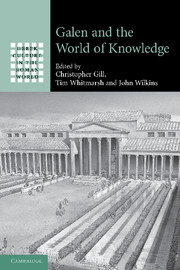Book contents
- Frontmatter
- Contents
- Notes on contributors
- Note on conventions
- Preface
- Introduction
- 1 Galen's library
- 2 Conventions of prefatory self-presentation in Galen's On the Order of My Own Books
- 3 Demiurge and Emperor in Galen's world of knowledge
- 4 Shock and awe: the performance dimension of Galen's anatomy demonstrations
- 5 Galen's un-Hippocratic case-histories
- 6 Staging the past, staging oneself: Galen on Hellenistic exegetical traditions
- 7 Galen and Hippocratic medicine: language and practice
- 8 Galen's Bios and Methodos: from ways of life to path of knowledge
- 9 Does Galen have a medical programme for intellectuals and the faculties of the intellect?
- 10 Galen on the limitations of knowledge
- 11 Galen and Middle Platonism
- 12 ‘Aristotle! What a thing for you to say!’ Galen's engagement with Aristotle and Aristotelians
- 13 Galen and the Stoics, or: the art of not naming
- Bibliography
- Index
12 - ‘Aristotle! What a thing for you to say!’ Galen's engagement with Aristotle and Aristotelians
Published online by Cambridge University Press: 06 August 2010
- Frontmatter
- Contents
- Notes on contributors
- Note on conventions
- Preface
- Introduction
- 1 Galen's library
- 2 Conventions of prefatory self-presentation in Galen's On the Order of My Own Books
- 3 Demiurge and Emperor in Galen's world of knowledge
- 4 Shock and awe: the performance dimension of Galen's anatomy demonstrations
- 5 Galen's un-Hippocratic case-histories
- 6 Staging the past, staging oneself: Galen on Hellenistic exegetical traditions
- 7 Galen and Hippocratic medicine: language and practice
- 8 Galen's Bios and Methodos: from ways of life to path of knowledge
- 9 Does Galen have a medical programme for intellectuals and the faculties of the intellect?
- 10 Galen on the limitations of knowledge
- 11 Galen and Middle Platonism
- 12 ‘Aristotle! What a thing for you to say!’ Galen's engagement with Aristotle and Aristotelians
- 13 Galen and the Stoics, or: the art of not naming
- Bibliography
- Index
Summary
INTRODUCTION
Since this volume is concerned with the topic ‘Galen and the world of knowledge’, it may be proper to begin this paper with a thought experiment about the way in which Galen would position himself within his own ‘world of knowledge’ – and how he would construe the spectrum of different strands of this intellectual world emanating from the prism of his own ego. Let us imagine Galen being subjected to an interview of the type one hears so often nowadays on radio or television and being invited to give an assessment of the factors that have contributed most significantly to his own intellectual development and to his formation as a scientifically and philosophically trained healer. For someone with only a superficial knowledge of Galen's writings, this is not difficult to imagine, for Galen is only too eager, at numerous passages in his work, to indulge in self-presentation, self-analysis and self-glorification. Being asked which of the philosophical schools and medical traditions he would rank highest, there is no doubt that, in his reply, Galen would give pride of place to Hippocrates and Plato; he would mention his personal medical teachers Pelops, Satyrus, Marinus and Numisianus; he would include references to some of the Hellenistic physicians, most notably the Alexandrian anatomists; and he would probably mention Posidonius in favourable terms too (though he would be much more critical of the older Stoics). When asked by the interviewer: ‘And what about Aristotle and the Peripatetic school?
- Type
- Chapter
- Information
- Galen and the World of Knowledge , pp. 261 - 281Publisher: Cambridge University PressPrint publication year: 2009
- 4
- Cited by

